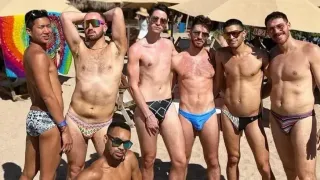
6 hours ago
Bella Ramsey Sends Candid Message to ‘The Last of Us’ Critics 'You Don't Have To Watch'
READ TIME: 3 MIN.
Bella Ramsey, the Emmy-nominated non-binary actor best known for their role as Ellie in HBO’s ‘The Last of Us,’ has never shied away from controversy, especially when it comes to representing queer characters and stories. In a recent interview on Entertainment Weekly’s The Awardist podcast, Ramsey addressed the fervor surrounding the show’s second season and delivered a candid message to critics who have voiced dissatisfaction with the series’ creative choices .
During the podcast, host Gerrad Hall asked Ramsey about the intense scrutiny and polarized opinions that often accompany adaptations—particularly those with deeply invested fanbases. Ramsey responded with characteristic honesty, explaining that they try to avoid online commentary and criticism, recognizing that such reactions are beyond their control: “I try to steer clear as much as I could, to be honest, because there's nothing I can do about it anyway. The show is out. There's nothing that can be changed or altered. So I'm like, there's not really any point in reading or looking at anything. So, yeah, people are of course entitled to their opinions. But it doesn't affect the show, it doesn't affect how the show continues or anything in any way. So it's just sort of a thing. They're very separate things to me. So no, I just don't really engage” .
When pressed about what they would say directly to the more vocal critics of season two as the series moves forward, Ramsey was unequivocal: “I would say, you don't have to watch it. If you hate it that much, the game exists. You can just play the game again. You don't have to watch it, but if you do want to watch it, then I hope you enjoy it” .
‘The Last of Us’ has been at the center of much cultural debate, not only for its narrative decisions but also for its progressive approach to LGBTQ+ representation. Ellie, portrayed by Ramsey, is a queer character whose journey is central to both the video game source material and the television adaptation. The series has earned praise for its nuanced depiction of queer relationships while also attracting negative attention from segments of the audience resistant to such visibility .
Ramsey’s response on The Awardist reflects a broader conversation about the unique challenges LGBTQ+ actors face, especially when their work disrupts traditional narratives or pushes for greater inclusivity. Their willingness to set boundaries with detractors echoes calls from across the queer creative community for respect, autonomy, and the space to tell authentic stories without fear of backlash .
Ramsey’s comments have resonated widely within LGBTQ+ circles, where their forthrightness is seen as both necessary and empowering. For many queer viewers, the presence of non-binary and openly queer talent in lead roles is a welcome sign of progress in an industry long criticized for its lack of diversity and authentic representation .
Moreover, their remarks serve as a reminder that representation is not merely about visibility, but about allowing queer creators and performers to navigate public attention on their own terms. By refusing to let criticism dictate the show’s direction or their own engagement with fans, Ramsey models a form of resilience that is deeply meaningful for LGBTQ+ audiences—many of whom have themselves endured invalidation or hostility for simply living authentically.
As ‘The Last of Us’ moves toward its third season, the discourse generated by Ramsey’s appearance on The Awardist signals a shifting landscape in entertainment—one where queer voices are not only present but empowered to defend their work without apology. While fan engagement remains a vital part of any fandom, Ramsey’s message is a pointed reminder that audiences have a choice: to support, to critique, or to simply walk away.
For the LGBTQ+ community, this moment is about more than just a television show. It is about the ongoing struggle for creative freedom, the necessity of boundary-setting in the face of online vitriol, and the celebration of queer joy both on and off the screen.
As Ramsey continues to break ground for non-binary and queer actors in mainstream media, their words on The Awardist will likely echo for seasons to come—inviting viewers to watch, to listen, or, if they so choose, to simply let queer stories unfold without interference.






